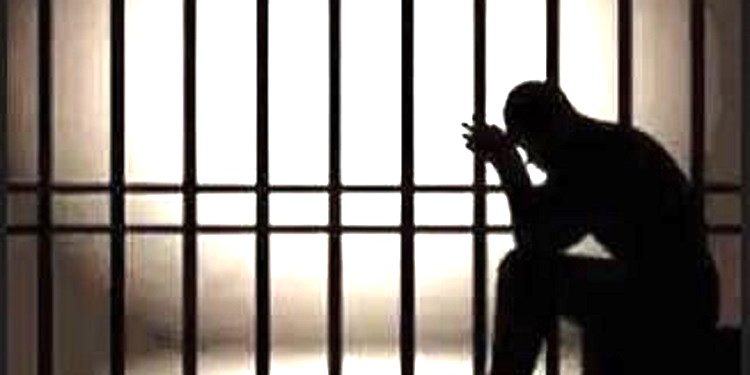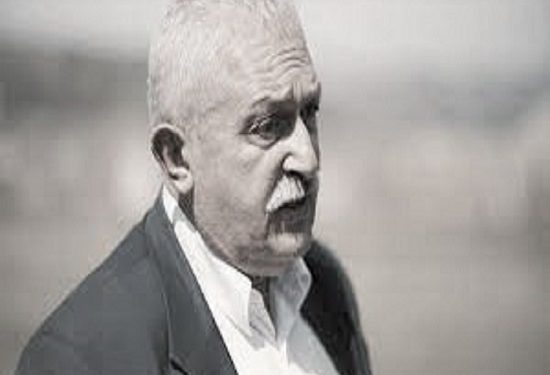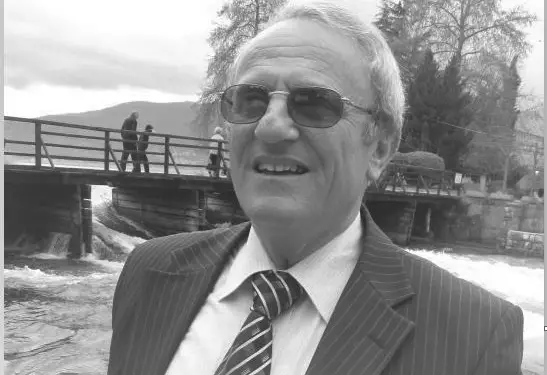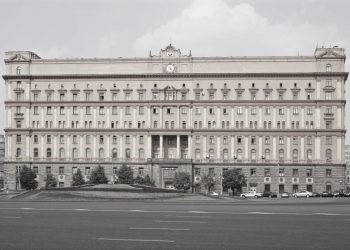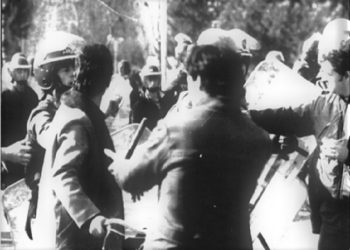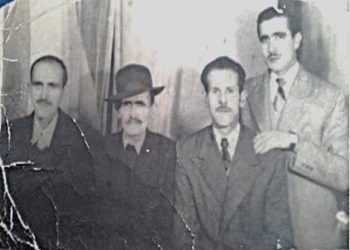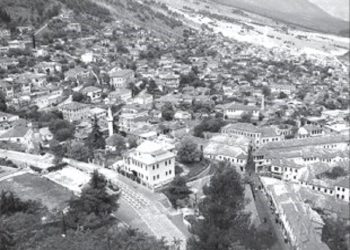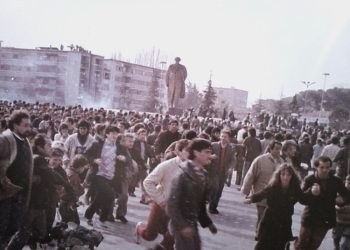From Shpendi Topollaj
– Marçel Hila, a pleasant surprise with his literature about the crimes of the dictatorship-
Memorie.al / If the author from Shkodran, Marçel Hila, had been given the place he deserved both in the print media and in the opinion of readers in general, I would probably not have entered this article at all, for his creativity, which speaks best, that we are dealing with a very prominent talent. There are three books by this writer that I read recently: “Pearl on the wound of a marriage”, “Memories from a distant mission” and the novel; “God descends into hell”. The first thing that occurred to me was: How much literary criticism owes to such writers. How are those who have read even one of these books silent? And I immediately sat down to list my impressions of his work, where I found: an intellectual with great culture, but also a complete writer with refined tastes. On every page of these books, nothing written with effort and scribbles catches your eye.
Everything flows quite naturally: in honest style, pure as the crystal water of our mountain streams, beautiful in its simplicity, an invisible praiser of the virtues of our people, a clear stigmatizer, but never imposing on our vices and especially of our historical bad luck, optimistic and full of light even when describing the sufferings and wretched miseries of the time of the dictatorship, or the intrigues of the ancient Greeks, without talking about the different psychological states of the protagonists, as if reads one of the tragedies left by the poet of Salamis, Euripides.
I think that like the eloquence of speech and finesse in writing, it is undoubtedly the most authentic expression of a person’s cultural level. And Marçeli fanatically preserves this quality in each of his paragraphs. Just as he manifests this culture, up to erudition, in the treatment of the topics he has chosen, in the information he finds there, in the analyzes of different and often almost unbelievable situations, and especially in the extremely rich vocabulary he uses.
Let’s take them in turn: The fate of the patriotic officer, Valentin, the son of the well-known general Preng Previzi, not only shocks you, but also makes you not forget the endless indignities of that hated system. He studied in Modena, fell in love with the good Italian girl Goricia, married her and experienced such great suffering and vicissitudes that even those that Odysseus went through with Penelope are worthless. The old Italians believed in the goddess of fortune who was called Fortuna and who was the daughter of Jupiter. She shared the good and the bad, the happiness and the misfortunes of people.
So Goricia begs her husband to go to a fortune teller before they leave for Albania. And even though he does not practice these things, he accepts and does not believe that woman, when she tells him that you; you will be separated by a big gap, you will suffer and you will be united after forty-eight years. As soon as they arrive in Shkodër, for no reason, only because his father was an opponent of the regime, they put the irons on him, cutting off the joy of his marriage, and an illiterate court sentences him to ten years in prison. The confused wife returns to her country, while he, even after prison, experiences endless years of persecution and exile. Only the advent of democracy enables connection with one’s wife and union with her. She had waited tirelessly for forty-eight years. The fortune of the Romans on the wheel of the fickleness of fortune still lived.
The next book; “Memories from a distant mission”, describes the trip during the accompaniment of Father Flavio Cavalin, in the areas of Dukagjin, Temal and Dushman, in Northern Albania. This 37-year-old Catholic priest, who had been a professor of theology in Verona, on the banks of the Adige River near Venice, in 1993, had stayed voluntarily in the mountains of Pulti, Shosh, Sala and Tropoja, where he needed a priest, in the poorest diocese of Albania. There has never been a lack of these voluntary emissaries of Catholicism, who accepted any kind of sacrifice and privation for our people, just as the opposite happened, until the Durrsak boy, Pelini, was martyred and canonized in defense of Christianity in Brindisi, Italy, without speaking of the defense of this religion was done by our National Hero Gjergj Kastrioti himself.
Marçel Hila, since religion was sacrilegious, received a sound religious upbringing in his family in Shkodër.
He knows well that from the ecclesiastical speech, it is an expression; “In camera caritatis”, which means “In the room of love”, that is, something that must be said in secret. This is exactly what two old mountaineers, Father Flavio, had asked through Zefi. And he, accompanied by Marçeli, as a translator, accepts without hesitation and through many difficulties, he arrives at them. I don’t want to dwell here with their interesting stories, but I want to emphasize the description of the unparalleled misery, where communism had condemned these people, that communism that by destroying the cult objects, had done, as the author says, that; “People were born and grew up without knowing what the mass was, the sacraments: baptism and confirmation, confession and the blessing of the wedding crown”. I don’t believe that in the Middle Ages, their grandparents lived worse.
This is how Marçeli himself describes this extreme poverty: “We walked and approached the door of that house, which until I die, I will not forget, because it was a door that did not close. It was destroyed. Due to poverty, they could not fix it. It was the house of misery and suffering…! The poverty that caught our eye was unique. I had never seen in my life, such a situation, or similar. Albania had been poor and we had all grown up in poverty, but that look had no equal. In my memory, there is no scene like it. The book “Les Miserables” by Victor Hugo, -… it can’t even be taken as an example to illustrate the poverty of a family”. And he reasons that; the latter, were the wretched of Paris, and these, the wretched of Dukagjin, Albania, for whom a pen had never been found to describe that misery, a camera to photograph it, and show it to the civilized world, their endless troubles.
In that room, where the floor was natural earth, without any bedding, with rough stone walls, not plastered, only with the binding mortar, and where it was as cold as outside, where it had snowed, there was no god who even by guesswork, to find out in which year that building was erected. And you want to cry, when with masterly brushes, the portrait of a paralyzed old man is painted, one of his hands was frozen, dead, and he could only move it by holding it with the other hand. And nearby, listen: there lay a girl, sixteen years old, white in the face, like paper, in the last days of her life, in agony, because she had leukemia.
And precisely these wretches, the so-called most progressive system of the world (what irony?!), did not leave them to their own troubles, but still made their lives miserable, inventing all kinds of atrocities and imprisoning and killing them, as it is said in quite accomplished novel; “God descends into hell”.
It has not yet been determined who among the poets of Portugal said; “Better dead than ashamed”. But in the practice of our highlanders, in the daily life of their lives, honor and dignity have been sacred, so much so that before shame, they have preferred death. And exactly this sanctity, the communists tried to tarnish. We encounter this truth in the middle of the ragtag mass, with brown coats that make up the dull crowd of bald-headed prisoners, with pale faces of Burrell, who during the peace, barely puts his feet, in the person of the mountaineer, Gjelos Gjeto Kola .
He doesn’t even know why he was punished! They have accused him of sheltering saboteurs there in his village, Shoshaj. But he has understood that such tricks have decided the gloomy fate of so many other men, politicians, intellectuals, clergymen and even communists of the first hours, but that the regime has now had enough of it, that it is not they come to work. What torments him to the point of pain is something else entirely. Something as heavy as a rock that doesn’t allow him to raise his head and say two words. There is a torturous worry, after they brought him as a witness in the trial, the one that no one can think of, a little more him! It was his dear son, Ndoi, the light of his eyes, who testified for him. It seems to him that everyone is talking about them, as a family of spies. So now, he sits isolated and numb. Nothing impresses him. Neither hunger, nor cold, nor endless suffering… but only the thought, what will fellow sufferers think of him?!
He sits isolated, gloomy, without moving his face, he wakes up “dead” from his sleep, and he passes the hours and days in silence, without any interest, without exchanging a single word, with a request, that is, isolated and indecipherable. So finished and unseasoned in soil. But can you spend the long years of prison, like this?! Without knocking on the door of the heart, of a friend, whom you need more than anywhere, exactly in prison. When others want to approach him, he, with some nobility, tells them back: – “Don’t worry about me, get men”! But others feel sorry for Gjeloshi and only the wise and knowledgeable, Father Antoni, manages to break it down and learn the truth from him. He continues his duty with sermons, with the word of Christ, which he repeated time and time again: “Do not be afraid of those who kill the flesh, because they have no power to kill your soul!” People like him, or other priests know how to keep up the morale of the unfortunate and not let them degrade into collaborators of the executioners, who do their best to put them in their nets. And the day comes that Gjelos confesses to Father Anton. For his part, Father Antoni, with calm reasoning, convinces this man to forgive his son, since they definitely forced him to speak against his father, as had actually happened.
However, when he calls Ndoi, to tell him that he has forgiven him, with the help of a dungeon spy, Sigurimi learns this and realizes a diabolical plan. Revenge on Ndoi, who opposes them, to unmask a priest of that area, Father John Gruda, saying that once I was wrong, that you forced me, but now, I will never say untrue things. Then they tell him that; we found out that you are going to reconcile with your father in prison, but know that he has tricks on you, as he wants to spit on you, in front of his friends, and tarnish you forever. All kinds of confused thoughts cross his mind. Threatened with imprisonment and destruction of the family, that man, after talking with his mother and wife, decides to escape, while his father Gjeloshi was waiting for him in Burrel. On the day he had a meeting, Gjeloshi, almost trembling, goes out to meet him, but he sees his wife, Dila, and his son’s daughter-in-law, dressed in black. He consoles the latter for the death of his uncle, and is surprised when his wife tells him that others have left us too!
And the mountain black cries, when he learns that his son, who had left with two slices of bread, was killed at the border and after two days, they brought him to the village and tied him to a cart. Then – his wife tells him – they threw him in a corner and they didn’t let us bury him like the others, but we were forced to cover him, next to a stoma. Before he left, he told his mother that he doesn’t forgive himself, but he apologizes to his father, who is the best in the world. It didn’t take long and Gjeloshi closed in on him, lost consciousness, fell into the bracket, managed to say the words in disarray; “I feel, father has forgiven you! How come you didn’t see my father?” and closed his eyes forever. As they escorted him to the cherry tree, the macabre song of joy of the guards, who believed that Albania was being saved, was heard. The author claims in the afterword, that he took the inspiration for this novel from a true fable and from what those who saw and experienced the communist hell told, such as; Father Pjetër Mëshkalla, Myfit Bushati, Metish Çeta, Xheladin Baci, Pjetër Arbnori, Xhevat Gjyrezi, Ahmet Bushati, Viktor Kujxhia, Agim Musta, Father Agostin Ashiku, Beqir Ajazi, etc.
But Marçeli, building those events artistically, has done a very important, civic duty. That it is not a question in this novel, only about the evils of that despotic power, nor about the injustices raised in the system like nowhere else, nor about the martyrdom of condemned clerics, without any fault, except their convictions, but we have confrontations and clashes of different worldviews. The dialogues between those intellectuals of the opposite wings take on philosophical dimensions. The false doctrine of Marxism is debated, the creator and implementer of the evil of our homeland, Machiavelli’s most diligent student, Enver Hoxha, is described.
His diabolical figure, Marçel Hila, like few others so far, has realized in thirty pages, which constitute the most impressive point of the novel. This is the merit of an author with a patriotic spirit, who knew how to use the memories of his childhood and school friends, who, in order to shut up, the cruelty hit the prisons, when they escaped the bullet. And in the literary analyses, when the comparison is made for the written work of Migjeni and Gjergj Fishta, the extremely high level of this writer, who follows in the footsteps of the best writers that Shkodra has produced, comes out the best all of Albania.
As I pointed out above, Marceli has dealt with the religious doctrine of Catholicism for a long time in this book. But he did not intend to blame the fate of the country on its function. On the contrary; he aims, and he succeeded, to turn the fate of religion and its representatives into the service of the Motherland. He does not operate artificially, with religious dogma, but with citizenship and love, for his country, preaches virtue and high human morality. He even defends the idea that Father Antoni did well when, after leaving prison, he forgave his interrogator. Especially in his two books, about the distant mission and God’s descent into Hell, Marcel excels in his knowledge of the history of Catholicism, and this clearly shows that he has long since made that old sentence his own; “Memoria minitur nisi eam exerceas”, which means that; Memory decreases, if not exercised!
But it should be known that he has kept his memory fresh with the many artistic books, etc., that he has read and especially lived and felt the suffering of others, as well as the misery of the homeland under communism. Today there are some strange theories that one should not deal too much with the past. It is necessary to look ahead, some say. Personally, I am not of the same opinion. We have the obligation and the responsibility to remind the generations what we took away, to tell the world good, where we come from and finally to honor the incurable wounds of the innocent, or those who were sent alive to Hell, just because they didn’t agree with them, who, as a character of this interesting novel says, having no soul, “have neither origin nor future, nor conscience nor morality”. Nothing more than that, Marçel Hila asks in his wise books, books that we like or don’t like, will give him the deserved place in our post-dictatorship literature. Memorie.al




